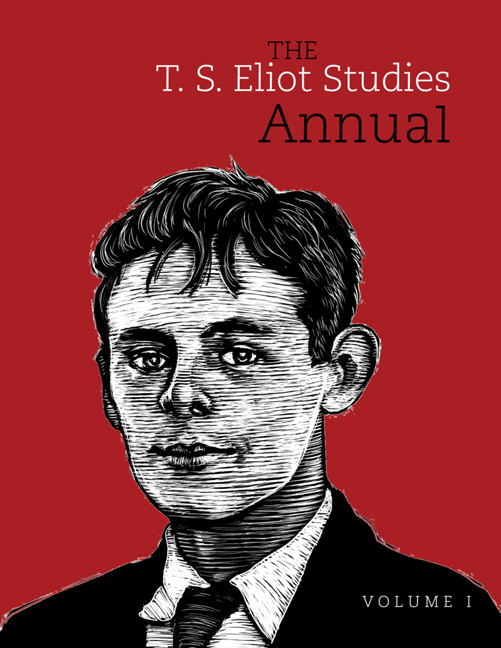Book contents
- Frontmatter
- Contents
- Abbreviations of Works
- General Editor's Note
- The Short and Surprisingly Private Life of King Bolo: Eliot's Bawdy Poems and Their Audiences
- Dull Tom-Tom's Absurd Prelude: Ludic Modernism in Early T. S. Eliot
- Eliot at Bergson's Lectures, 1910–1911
- The American Legacy of “Prufrock”
- Poetry (June 1915)
- The Stale Dregs of Revolt
- Prufrock, Belated
- Eliot's Allusive Legacy and Obscurity in “Prufrock”
- Transmuting F. H. Bradley: T. S. Eliot's Notes Towards a Theory of Poetry
- T. S. Eliot, Phenomenologist
- Astride the Dark Horse: T. S. Eliot and the Lloyds Bank Intelligence Department
- Aristophanic Structures in Sweeney Agonistes, “The Hollow Men,” and Murder in the Cathedral
- Eliot and Virgil in Love and War
- T. S. Eliot Bibliography 2014
- Notes on Contributors
T. S. Eliot, Phenomenologist
- Frontmatter
- Contents
- Abbreviations of Works
- General Editor's Note
- The Short and Surprisingly Private Life of King Bolo: Eliot's Bawdy Poems and Their Audiences
- Dull Tom-Tom's Absurd Prelude: Ludic Modernism in Early T. S. Eliot
- Eliot at Bergson's Lectures, 1910–1911
- The American Legacy of “Prufrock”
- Poetry (June 1915)
- The Stale Dregs of Revolt
- Prufrock, Belated
- Eliot's Allusive Legacy and Obscurity in “Prufrock”
- Transmuting F. H. Bradley: T. S. Eliot's Notes Towards a Theory of Poetry
- T. S. Eliot, Phenomenologist
- Astride the Dark Horse: T. S. Eliot and the Lloyds Bank Intelligence Department
- Aristophanic Structures in Sweeney Agonistes, “The Hollow Men,” and Murder in the Cathedral
- Eliot and Virgil in Love and War
- T. S. Eliot Bibliography 2014
- Notes on Contributors
Summary
Eliot's Context
In the middle of the twentieth century, British idealist philosophy was facing a slow but unmistakable decline in popularity. It would be replaced with a hard-nosed, literalist form of language philosophy. One could no longer take The Idea for granted; an analysis of form was required to defend metaphysical claims. Early twentieth-century philosophy had circumnavigated questions of form: How did language attach itself to the world? How did meaning work? The death of idealism at mid-century would signal the decline in popularity of absolutes and mark a shift toward logical analysis. C. S. Lewis describes the decline of idealism as the fall of a broader philosophical approach:
Nor can a man of my age ever forget how suddenly and completely the idealist philosophy of his youth fell. McTaggart, Green, Bosanquet, Bradley seemed enthroned for ever; they went down as suddenly as the Bastille. And the interesting thing is that while I lived under that dynasty I felt various difficulties and objections which I never dared to express. They were so frightfully obvious that I felt sure they must be mere misunderstandings: the great men could not have made such very elementary mistakes as those which my objections implied.
Not without reservation, T. S. Eliot greatly admired idealism, and allusions to his disappointment with its fall appear in papers he drafted as a doctoral candidate in philosophy at Harvard and, occasionally, in his retrospective late work. Lines from “East Coker,” for instance, recall a generational paradigm shift in terms that resonate with Lewis's recollection of the decline of idealism: “And the wisdom of age? Had they deceived us, / Or deceived themselves, the quietvoiced elders, / Bequeathing us merely a receipt for deceit?” In an unsigned New Statesman review titled “A Contemporary Thomist” (1917), Eliot wrote of “[Bertrand] Russell who has insisted that philosophy must proceed from the simple, if it can be found, to the complex; and [of F. H.] Bradley, who has insisted that the simple cannot be found. These two writers between them have nearly laid metaphysics in the grave.” Although Eliot took inspiration from both, he was not a disciple of either, and he was skeptical at times of both idealism and realism.
- Type
- Chapter
- Information
- The T. S. Eliot Studies Annual , pp. 114 - 130Publisher: Liverpool University PressPrint publication year: 2017



